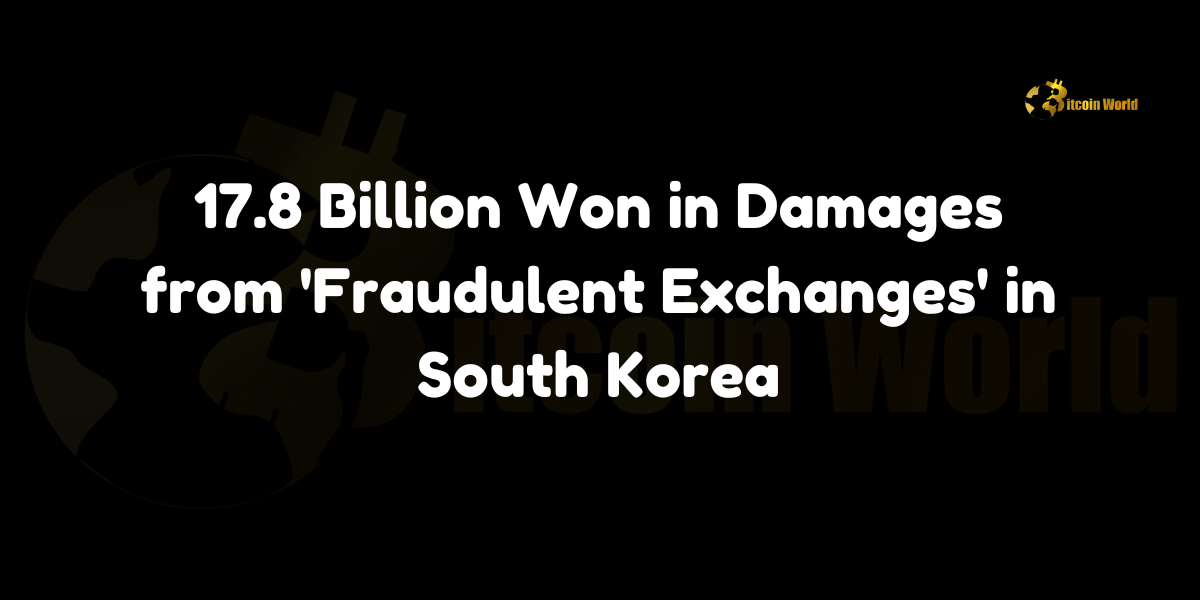17.8 Billion Won in Damages from ‘Fraudulent Exchanges’ in South Korea
In a concerning update for the South Korean cryptocurrency community, the Financial Services Commission (FSC) has disclosed that customer deposits totaling 17.817 billion won (approximately $12.9 million) are held by 11 crypto exchanges that have suspended operations since last year. This revelation was reported by People Power Party lawmaker Kang Min-guk and covered by the local daily newspaper JoongAng Ilbo. Despite ongoing investigations, authorities still lack a comprehensive understanding of the total unreturned deposits from these fraudulent exchanges that have temporarily halted their services, including deposits and withdrawals.
Overview of the Fraudulent Exchanges Incident
Key Figures
- Total Damages: 17.817 billion won ($12.9 million)
- Number of Affected Exchanges: 11
- Timeframe: Suspensions from last year to recent months
The reported damages stem from customer deposits held by exchanges that have ceased operations, raising significant concerns about the security and reliability of cryptocurrency platforms in South Korea.
Nature of the Fraud
The affected exchanges have been labeled as “fraudulent” due to their inability to return customer deposits and honor withdrawal requests. These actions have left approximately 700 NFP (NFPrompt) token holders on platforms like Coinone unable to access their funds, exacerbating the financial strain on individual investors.
Regulatory Response and Investigations
Role of the Financial Services Commission
The Financial Services Commission (FSC) is the primary regulatory body overseeing financial markets in South Korea, including the burgeoning cryptocurrency sector. Lawmaker Kang Min-guk received the data from the FSC, highlighting the extent of financial losses incurred by retail investors due to the collapse of these exchanges.
Current Challenges
Despite the significant amount of lost deposits, authorities face challenges in fully accounting for all unreturned funds. The complexity of cryptocurrency transactions and the cross-border nature of some exchanges complicate efforts to trace and recover the lost assets.
Impact on Investors and the Crypto Market
Investor Confidence
The suspension of operations by multiple crypto exchanges has severely impacted investor confidence in the South Korean cryptocurrency market. Retail investors, in particular, have been left vulnerable, with limited avenues for recourse to reclaim their lost deposits.
Market Stability
The collapse of these exchanges contributes to increased volatility in the cryptocurrency market. As more exchanges face operational difficulties, the overall stability of the market is threatened, potentially deterring new investors from entering the space.
Case Study: Coinone and NFP Token Holders
Specific Incident
A notable example involves Coinone, a major South Korean crypto exchange, where the ApeCoin Treasury has been implicated in transferring significant amounts of APE tokens, further complicating the situation for affected users.
Customer Deposits and Token Sales
- APE Tokens Sold: 5 million APE ($7.55 million) recently transferred to Binance through Wintermute.
- Total Revenue Generated: 969,945 SOL ($162 million)
This case highlights the broader issues of asset management and regulatory oversight within South Korea’s crypto exchanges.
Expert Opinions
Dr. Emily Carter, Blockchain Security Analyst
“The scale of losses reported by the FSC underscores the urgent need for enhanced regulatory frameworks and security protocols within South Korea’s cryptocurrency exchanges. Without robust measures, investor protection remains inadequate, leaving individuals exposed to significant financial risks.”
Mark Thompson, Financial Strategist
“The repeated suspensions of crypto exchanges in South Korea reflect underlying vulnerabilities in the market’s infrastructure. Strengthening regulatory oversight and ensuring transparent operational practices are essential steps toward restoring investor trust and market integrity.”
Sarah Lee, DeFi Researcher
“The challenges faced by authorities in tracking unreturned deposits highlight the complexities of regulating decentralized financial systems. Collaborative efforts between regulatory bodies and crypto platforms are crucial to mitigate fraud and protect investors in this rapidly evolving landscape.”
Future Outlook and Recommendations
Strengthening Regulatory Frameworks
To prevent future incidents, the Financial Services Commission should consider implementing stricter licensing requirements for crypto exchanges, mandating higher standards of transparency and security.
Enhancing Investor Protections
Introducing comprehensive insurance schemes for customer deposits and establishing clear guidelines for recourse in the event of exchange failures can provide better protection for retail investors.
Promoting Industry Collaboration
Facilitating collaboration between regulators, crypto exchanges, and cybersecurity firms can lead to the development of more effective fraud detection and prevention mechanisms, safeguarding the interests of all market participants.
Conclusion
The revelation of 17.8 billion won in damages from fraudulent crypto exchanges in South Korea highlights significant challenges within the country’s cryptocurrency ecosystem. As authorities strive to gain a clearer understanding of the extent of unreturned deposits, the incident serves as a stark reminder of the need for robust regulatory oversight and enhanced security measures. Protecting investors and ensuring market stability must remain paramount to foster a safe and trustworthy environment for cryptocurrency adoption.
To stay updated on the latest developments in cryptocurrency regulation and market trends, explore our article on latest news, where we cover significant events and their impact on digital assets.
Disclaimer: The information provided is not trading advice, Bitcoinworld.co.in holds no liability for any investments made based on the information provided on this page. We strongly recommend independent research and/or consultation with a qualified professional before making any investment decisions.




